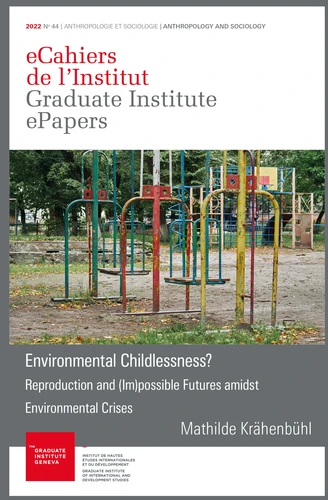‘Environmental Childlessness?’. Reproduction and (Im)possible Futures amidst Environmental Crises
Par :Formats :
Disponible dans votre compte client Decitre ou Furet du Nord dès validation de votre commande. Le format Multi-format est :
- Pour les liseuses autres que Vivlio, vous devez utiliser le logiciel Adobe Digital Edition. Non compatible avec la lecture sur les liseuses Kindle, Remarkable et Sony
 , qui est-ce ?
, qui est-ce ?Notre partenaire de plateforme de lecture numérique où vous retrouverez l'ensemble de vos ebooks gratuitement
Pour en savoir plus sur nos ebooks, consultez notre aide en ligne ici
- FormatMulti-format
- ISBN978-2-940600-39-7
- EAN9782940600397
- Date de parution21/02/2022
- Protection num.NC
- Infos supplémentairesMulti-format incluant PDF avec W...
- ÉditeurGraduate Institute Publications
Résumé
Although voluntary childlessness based on environmental concerns is increasingly in evidence, the relationship between environmental crises and reproductive intentions has not yet significantly entered academic debate. Nonetheless, it articulates concrete ways in which the perception of environmental crises (re)shapes people's lives in western societies. In an attempt to explore human reproduction as a site of environmental interrogations, this research asks how environmental degradation is (re)shaping reproductive intentions and what the pathway is towards 'environmental childlessness'.
Mobilising different scholarship and ethnographic interviews, I propose that the pathway towards 'environmental childlessness' is informed by profound uncertainties about the future, ethical interrogations, and persistent pronatalism. More than an over-simplifying update of neo-Malthusian and apocalyptic thinking, interrogations of parenthood express a broader rejection of current capitalist ways of living.
Furthermore, rather than signalling a pessimistic disengagement from the future, 'environmental childlessness' appears to be a bid to attain a 'meaningful' life. We extend our heartfelt thanks to the Vahabzadeh Foundation for financially supporting the publication of best works by young researchers of the Graduate Institute, giving a priority to those who have been awarded academic prizes for their master's dissertations.
Mobilising different scholarship and ethnographic interviews, I propose that the pathway towards 'environmental childlessness' is informed by profound uncertainties about the future, ethical interrogations, and persistent pronatalism. More than an over-simplifying update of neo-Malthusian and apocalyptic thinking, interrogations of parenthood express a broader rejection of current capitalist ways of living.
Furthermore, rather than signalling a pessimistic disengagement from the future, 'environmental childlessness' appears to be a bid to attain a 'meaningful' life. We extend our heartfelt thanks to the Vahabzadeh Foundation for financially supporting the publication of best works by young researchers of the Graduate Institute, giving a priority to those who have been awarded academic prizes for their master's dissertations.
Although voluntary childlessness based on environmental concerns is increasingly in evidence, the relationship between environmental crises and reproductive intentions has not yet significantly entered academic debate. Nonetheless, it articulates concrete ways in which the perception of environmental crises (re)shapes people's lives in western societies. In an attempt to explore human reproduction as a site of environmental interrogations, this research asks how environmental degradation is (re)shaping reproductive intentions and what the pathway is towards 'environmental childlessness'.
Mobilising different scholarship and ethnographic interviews, I propose that the pathway towards 'environmental childlessness' is informed by profound uncertainties about the future, ethical interrogations, and persistent pronatalism. More than an over-simplifying update of neo-Malthusian and apocalyptic thinking, interrogations of parenthood express a broader rejection of current capitalist ways of living.
Furthermore, rather than signalling a pessimistic disengagement from the future, 'environmental childlessness' appears to be a bid to attain a 'meaningful' life. We extend our heartfelt thanks to the Vahabzadeh Foundation for financially supporting the publication of best works by young researchers of the Graduate Institute, giving a priority to those who have been awarded academic prizes for their master's dissertations.
Mobilising different scholarship and ethnographic interviews, I propose that the pathway towards 'environmental childlessness' is informed by profound uncertainties about the future, ethical interrogations, and persistent pronatalism. More than an over-simplifying update of neo-Malthusian and apocalyptic thinking, interrogations of parenthood express a broader rejection of current capitalist ways of living.
Furthermore, rather than signalling a pessimistic disengagement from the future, 'environmental childlessness' appears to be a bid to attain a 'meaningful' life. We extend our heartfelt thanks to the Vahabzadeh Foundation for financially supporting the publication of best works by young researchers of the Graduate Institute, giving a priority to those who have been awarded academic prizes for their master's dissertations.



